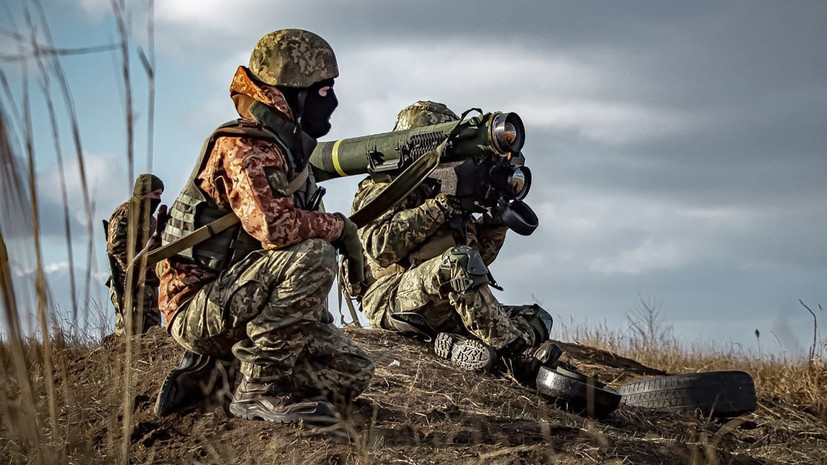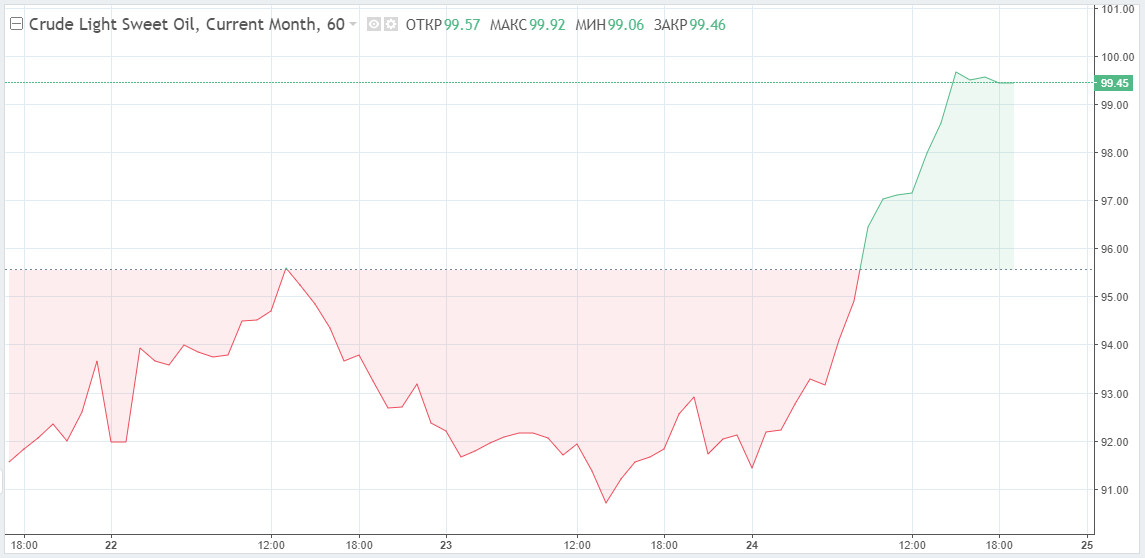
Benchmark oil prices immediately reacted to the invasion of Ukraine by the Russian army. Thus, the cost of April futures for Brent on the London Stock Exchange ICE Futures on Thursday rose by 7%, to $101.21 per barrel. Notably, the price of Brent exceeded $100 for the first time today since September 2014. At the close of trading on Wednesday, these contracts were at $96.84.
Currently, the price of April futures on WTI on electronic trades of the New York Mercantile Exchange rose to $99.46 per barrel. By the end of Wednesday's trading, the price was $92.1.

On Thursday morning, Russian President Vladimir Putin said that it was time for a special military operation because of the situation in Donbas. Russian troops attacked the Ukrainian border at approximately 05:00 Moscow time from Russia and Belarus. Media sources from early morning reported explosions in Kyiv, Kharkiv, Odesa, Kramatorsk, Mariupol, and Dnipropetrovsk.
According to the Ukrainian Border Guard Service, attacks on border units and checkpoints are carried out using artillery, small arms, and heavy equipment. Ukrainian President Vladimir Zelensky declared martial law throughout his country.
The Russian Ministry of Defense stated that the Russian army uses high-precision weapons only to disable Ukraine's military infrastructure, air defense facilities, military airfields, and aviation, and the Russian army does not strike any cities or civilians.
In a speech addressed to the citizens of Russia and Ukraine in a live broadcast, the Russian President stated that the Russian authorities do not plan to occupy Ukrainian territories. Putin promised the civilians that the special military operation is aimed solely at protecting people who have endured genocide by the Kyiv authorities for eight years. "We are not going to impose anything on anyone by force," the Russian president said in the address, urging the Ukrainian military to lay down their weapons and not to clash with the Russian army.
Ukrainian President Zelensky confirmed that military and border units as well as other important defense facilities were being attacked. At the same time, Ukrainian Foreign Minister Dmytro Kuleba stated that the strikes were also targeting cities.
It has been reported that 11 airports in the south of Russia are closed until March 2. Rosmorrechflot reported a ban on ship traffic in the Sea of Azov until a special order of the Russian Defense Ministry is received.
US President Joe Biden strongly condemned Russia's invasion of Ukraine and announced that the G7 leaders and US allies would impose the toughest sanctions against Russia. For his part, Josep Borrell, head of the European Commission, said that the European Union would also adopt the toughest package of sanctions against Russia. The EU is expected to block access to key technologies and markets in all strategic sectors of the Russian economy.
Markets reacted to this situation with a collapse, as a result of which the Moscow Exchange was forced to suspend trading in all instruments for two hours. After trading was restored, the ruble-to-dollar exchange rate plummeted to an all-time low of 89.60. Against the euro, the Russian ruble almost touched 100.00. The Russian central bank was forced to intervene in the foreign exchange market to somehow stabilize the situation. And thanks to this support, the ruble has stopped the fall.
The outbreak of hostilities increases the risk of disruption of Russian oil and gas supplies. Experts are actively predicting a surge in oil prices to $120 per barrel and in gas prices to more than $1,200.
Gas prices in Europe have long been a burning issue. As of today, its price in European countries has increased to $1,042 per 1,000 cubic meters, particularly, at the most liquid European hub, the Title Transfer Facility (TTF) in the Netherlands.
German media are no longer hiding their anxious sentiments and published an interview with German Finance Minister Christian Lindner, who has long believed that the Russian government could be blackmailed by the possibility of the launch of Nord Stream 2. Lindner admits that without pipeline gas from Russia the economy of Germany and the European Union as a whole will be hit by a real collapse.
German Chancellor Olaf Scholz ordered the Ministry of Economics to withdraw its conclusion that there are no risks for the German gas market if the Russian Federation's Nord Stream 2 is launched. On the one hand, it seems that the Chancellor has stopped the certification of the Russian pipeline. However, it becomes clear that this is not the case.
The Ministry of Economy does not influence the certification of the pipeline because the Federal Network Agency (FNA) is in charge of this. Thus, the certification is not stopped or even extended. The Ministry of Economy can only submit a report to the FNA, which will make the final decision.
According to Lindner's statement, there is a wide range of opinions among German politicians. Understandably so, since Germany is the eighth largest consumer of natural gas. Over the last six years, Germany has increased its consumption to 86 billion cubic meters (by 2020) from 73 billion in 2014. Every year, the German government buys more and more natural gas from abroad: 97 billion cubic meters were imported in 2013, and in 2020 this figure reached 155.5 billion. The last three nuclear power plants are expected to shut down by the end of 2022, after which the import of natural gas to Germany is likely to increase significantly.
When it comes to electricity consumption, everything is depressing as well. Last year, German consumption was at 535 terawatt-hours, but German generators only managed to generate 484 terawatt-hours.
According to a report by the German organization Clean Energy Wire, the country's alternative energy revolution is showing strong stagnation. Switching to completely green energy sources is not possible in the foreseeable future. Clean Energy Wire explains that natural gas accounts for more than 25% of the primary energy mix, and its share continues to grow.
Germany imports more natural gas than any other European country. Moreover, it also buys more electricity than other countries. All of these factors lead to an increase in the cost of electricity for consumers. An average German resident now pays $0.32 per kilowatt-hour.
supplies of liquefied natural gas from the United States will not improve the situation. For example, official sources in January indicated that an unprecedented volume of natural gas arrived at EU regasification terminals - as much as 7.1 million tons or 9.8 billion cubic meters. If we subtract this share, we get an average monthly supply of 6.1 billion cubic meters. With record deliveries, 76 billion cubic meters arrived in Europe in 2021. At the same time, natural gas supplies from Russia to Europe this year will amount to more than 200 billion cubic meters.
According to Qatar's Energy Minister, the main supplier of LNG to Europe, there is simply no substitute for Russian pipeline gas today. Qatar is unable to increase the production of gas, and the current volumes are contracted under long-term agreements. Recently, Italian Foreign Minister Luigi Di Maio also expressed this point.
Residents of Germany will have to pay triple tariffs for heating and electricity due to recent events and the German Chancellor's comments on Nord Stream 2.
The cost of oil and gas will rise steadily due to uncertainty, lack of understanding of where the military action in Ukraine will stop, and what will be the response to it. Realistically, the market is now pricing in the risks of physical restrictions on oil or gas supplies from Russia. A high probability of harsh sanctions is one of the factors of the price rally. A scenario in which NATO forces might enter the war is not excluded either.
Naftogaz, Gazprom, and other European gas companies have not stopped pumping and receiving Russian gas which means that the gas transit continues.
Dmitry Marinchenko, Director of the Natural Resources Group at Fitch Ratings in London, believes that there should be no sanctions banning the export of Russian oil. Today the share of Russian oil on the world market is more than 10%, Gazprom's share in Europe is more than 30%, and there is nothing to replace Russian commodities with.
If gas supplies from Russia are disrupted, the energy crisis in Europe will become extreme, a deficit will be created, and gas prices will skyrocket.
 English
English 
 Русский
Русский Bahasa Indonesia
Bahasa Indonesia Bahasa Malay
Bahasa Malay ไทย
ไทย Español
Español Deutsch
Deutsch Български
Български Français
Français Tiếng Việt
Tiếng Việt 中文
中文 বাংলা
বাংলা हिन्दी
हिन्दी Čeština
Čeština Українська
Українська Română
Română

